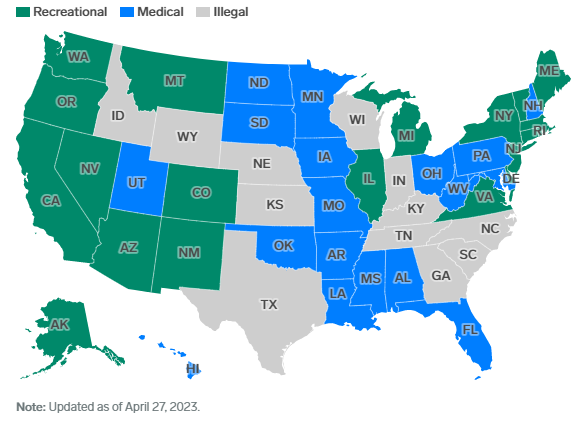A couple of months ago Delaware became the 22nd US state to legalise recreational use of cannabis. It’ll be taxed at 15% with half the revenue going to a Justice Reinvestment Fund, which is there to “improve quality of life for communities most impacted by the prohibition of marijuana and ‘war on drugs’ era policies.”
Medical usage is now legal in 38 US states in addition to Washington DC.
Here’s a map showing where and where not, courtesy of Business Insider.

In Washington state, legislation is going through the system that helps ensure its new status is respected in a practical as well as legal sense. It will be illegal to discriminate amongst job applicants based on their use of cannabis, so no mandatory pre-interview drug test and the like.
This makes sense because 1) cannabis is legal and the average employer has no business caring about what you do in your spare time when it doesn’t affect your work performance, and 2) current tests for cannabis look for the presence of it in bodily fluids rather than whether you’re “intoxicated” from it right now. You can test positive days or potentially weeks after you actually ingested the cannabis. So if the concern is around something like turning up to work high then the tests won’t help in any case.
There’ll remain some exemptions to the anti-discrimination law for certain jobs in industries like airlines or those requiring security clearance. And employers can still test you after you’re hired.
These exemptions are controversial in some quarters, with a representative from The Cannabis Alliance drawing the parallel that:
If the same approach were applied to alcohol, employers would refuse employment to anyone who enjoyed a beer or glass of wine on the weekend
Meanwhile, over here in the UK, there’s been no substantive move in legislation for years for the general use-case. At least not in a sensible direction. Cannabis remains a wholly illegal class B drug, in the same category as for instance amphetamines, whereby mere possession could in theory result in a prison sentence of 5 years and an unlimited fine. It was actually reclassified from a lesser-penalised class C drug to a class B drug in 2009, which has been its status for the vast majority of time since the 1971 Misuse of Drugs Act came into force.
There was one positive and humane move in 2018 when cannabis and some of its derivates were legalised for UK medical use. At least in theory, but seemingly it’s under such restrictive controls that it’s hardly available in practice.
The NHS details the medical conditions it’d be considered for as:
Very few people in England are likely to get a prescription for medical cannabis. Currently, it is only likely to be prescribed for the following conditions:
- children and adults with rare, severe forms of epilepsy
- adults with vomiting or nausea caused by chemotherapy
- people with muscle stiffness and spasms caused by multiple sclerosis (MS)
It would only be considered when other treatments were not suitable or had not helped.
But even when these conditions are met, patients report that the NHS rarely delivers the goods. From the BBC:
The NHS has repeatedly refused to fund medical cannabis for children with severe epilepsy, families have said.
Three prescriptions are thought to have been written for “whole plant cannabis” oil since it was legalised two years ago, campaign group End Our Pain say.
This leaves families of patients for which these medicines truly do seem to help needing to raise vast sums of money and/or access the uncontrolled black market at the risk of their own liberty in order to get hold of what they need to live a reasonable quality of life.